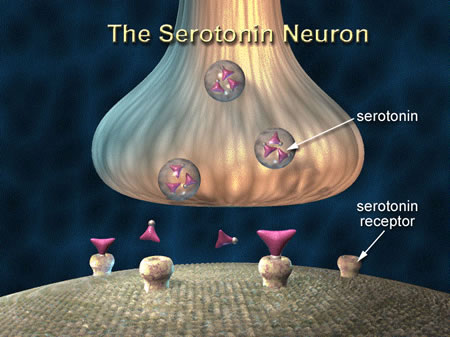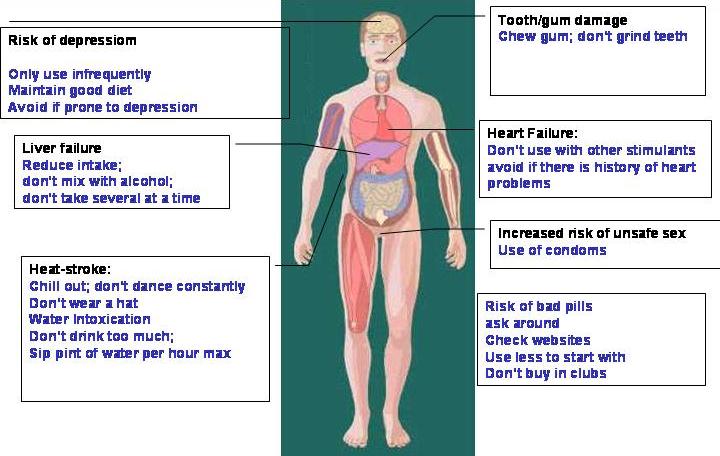The amino acid tryptophan, which is a component of protein and which humans eating a normal diet consume in significant amounts. High levels of tryptophan in the blood signal the brain to make serotonin, which has many beneficial consequences on mood and affect, including promoting happiness, relaxation and the ability to get a good night's sleep. Serotonin is sometimes thought of as a "happy" neurotransmitter.
Where deficiencies in the molecule can lead to depression and fear, appropriate levels of serotonin secretion bathe neurons in the brain in chemicals that help promote feelings of comfort, contentment and well-being. In their book "Biochemistry," Drs. Reginald Garrett and Charles Grisham explain that the brain makes serotonin when it's signaled to do so. One signal is carbohydrate consumption, which explains why may individuals experience feelings of contentment or happiness upon eating a sugary or starchy snack. Serotonin is so important to happiness; in fact, patients with depression receive prescriptions to help the brain artificially increase serotonin levels, which relieves symptoms.
One of the benefits of serotonin is sleepiness, which, while not necessarily a benefit at the wrong time of day, is certainly welcome at night. A 2010 study in the scientific journal "Sleep" notes that if the brain's serotonin transporters are misshapen, patients experience insomnia. Further, individuals who have difficulty sleeping have long been advised to try a glass of warm milk before bed. Milk, like many sources of protein, contains the amino acid tryptophan, which signals the brain to make more serotonin and which may produce feelings of sleepiness.
A "feel-good" hormone, serotonin helps people to feel relaxed and contented. Macalester College notes that studies tie low serotonin levels to anxiety; like depression, chronic anxiety may be treated with drugs that help increase levels of serotonin in the brain. Like many hormones and brain chemicals, however, serotonin functions best when it's at optimal concentrations. Normal levels of the chemical promote relaxation, but extra won't necessarily increase feelings of well being it may just make the individual feel sleepy.
There are many researchers who believe that an imbalance in serotonin levels may influence mood in a way that leads to depression. Possible problems include low brain cell production of serotonin, a lack of receptor sites able to receive the serotonin that is made, inability of serotonin to reach the receptor sites, or a shortage in tryptophan, the chemical from which serotonin is made. If any of these biochemical glitches occur, researchers believe it can lead to depression, as well as obsessive-compulsive disorder, anxiety, panic, and even excess anger.
 While opposing Studies have shown that medical students and residents
are susceptible to undue influence from pharmaceutical companies due to
the companies involvement in medical school programs.
Antidepressants have been shown to have only a minimal effect, over that
of a placebo, on patients. In an analysis of the efficacy data
submitted to the U.S. Food and Drug Administration for approval of the
six most widely prescribed antidepressants approved between 1987 and
1999.
While opposing Studies have shown that medical students and residents
are susceptible to undue influence from pharmaceutical companies due to
the companies involvement in medical school programs.
Antidepressants have been shown to have only a minimal effect, over that
of a placebo, on patients. In an analysis of the efficacy data
submitted to the U.S. Food and Drug Administration for approval of the
six most widely prescribed antidepressants approved between 1987 and
1999.
In an essay on advertisements for anti-depressants published in PLoS Medicine, social work academic Jeffrey Lacasse and neuroanatomist Jonathan Leo state that, despite this, the chemical imbalance theory is promoted by the medical industry as an explanation to depression and that their medicines correct the chemical imbalance. They also state that there is some evidence that both patients and professionals are influenced by the advertisements and patients may get prescribed medicines when other interventions are more suitable.
Serotonin syndrome is a potentially life-threatening drug reaction that may occur following therapeutic drug use, inadvertent interactions between drugs, overdose of particular drugs, or the recreational use of certain drugs. The excess serotonin activity produces a spectrum of specific symptoms including cognitive, autonomic, and somatic effects. The symptoms may range from barely perceptible to fatal. Symptom onset is usually rapid, often occurring within minutes. Serotonin syndrome encompasses a wide range of clinical findings. Mild symptoms may only consist of increased heart rate, shivering, sweating, dilated pupils, myoclonus (intermittent tremor or twitching), as well as overresponsive reflexes. Moderate intoxication includes additional abnormalities such as hyperactive bowel sounds, high blood pressure and hyperthermia; a temperature as high as 40 °C (104 °F) is common in moderate intoxication. The overactive reflexes and clonus in moderate cases may be greater in the lower limbs than in the upper limbs. Mental status changes include hypervigilance and agitation. Severe symptoms include severe increases in heart rate and blood pressure that may lead to shock. Temperature may rise to above 41.1 °C (106.0 °F) in life-threatening cases.
Many medications may have been incorrectly thought to cause serotonin syndrome. For example, some case reports have implicated atypical antipsychotics in serotonin syndrome, but it appears based on their pharmacology that they are unlikely to cause the syndrome. Various drugs, other than Selective serotonin reuptake inhibitors, also have clinically significant potency as serotonin reuptake inhibitors, (e.g. tramadol, amphetamine, and MDMA) and are associated with severe cases of the syndrome.
 Researchers in the Netherlands enlisted 10 men in their mid-20s and seven in their early 20s for the study. The 10 in the mid-20s were long-term users of ecstasy. The other seven men were healthy and had no history of ecstasy use.
Researchers in the Netherlands enlisted 10 men in their mid-20s and seven in their early 20s for the study. The 10 in the mid-20s were long-term users of ecstasy. The other seven men were healthy and had no history of ecstasy use.
The researchers write that the young men in the ecstasy group had not used the drug, on average, for more than two months before the study began, but had taken an average of 281 ecstasy tablets over the past 6.5 years.
The hippocampal volume in the ecstasy group was 10.5% smaller than those in the non-ecstasy group, the MRI brain scans showed. What’s more, the overall proportion of gray matter was 4.6% lower, on average, among ecstasy users. The researchers say this suggests that the effects of ecstasy may not be restricted to the hippocampus region alone.
“Taken together, these data provide preliminary evidence suggesting that ecstasy users may be prone to incurring hippocampal damage following chronic use of this drug,” the researchers write. Their findings, they report, mirror previous research that has indicated acute swelling and later atrophy of hippocampal tissue in long-term ecstasy users. “Hippocampal atrophy is a hallmark for diseases of progressive cognitive impairment in older patients, such as Alzheimer’s disease,’’ the researchers say.
“Since the hippocampus plays an essential role in long-term memory, the present findings are of particular interest in view of various studies showing that ecstasy users display significant memory impairments, whereas their performance on other cognitive tests is generally normal,” the researchers concluded.
 Also as the brain ages, deficiencies in neurotransmitters such as serotonin are more likely to occur. Low serotonin is not so much a specific risk factor for mild cognitive impairment and Alzheimer’s as it is a sign that overall brain health and function are compromised. Likewise, boosting serotonin production may not necessarily prevent mild cognitive impairment or Alzheimer’s.
Also as the brain ages, deficiencies in neurotransmitters such as serotonin are more likely to occur. Low serotonin is not so much a specific risk factor for mild cognitive impairment and Alzheimer’s as it is a sign that overall brain health and function are compromised. Likewise, boosting serotonin production may not necessarily prevent mild cognitive impairment or Alzheimer’s.
The chemical balance of serotonin has the ability to keep a check on our sleep cycles and our emotions. The fallout of could be anything from disturbed sleep cycles to depression, memory loss and perhaps Alzheimer's disease. While food, sun and exercise is the natural order to keep our selves balanced, it may not be the case as over worked shift patterns and starchy comfort foods take that away. The delicate balance of our hormones may signify the initial fallout of todays demanding lives, the resulting imbalance may prove if our low income high stress jobs are worth it in the end...






No comments:
Post a Comment